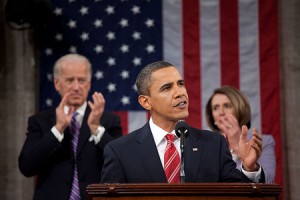What The President Said About Education In The State Of The Union
President Barack Obama again asked Congress to expand access to early childhood education programs and defended a major federal grant program, but didn’t propose any new initiatives.
Education Week has the recap here:
President Barack Obama placed education at the center of a broad strategy to bolster economic mobility and combat poverty—calling on Congress in his State of the Union speech to approve previously unveiled initiatives to expand preschool to more 4-year-olds, beef up job-training programs, and make post-secondary education more effective and accessible.
“Last year, I asked this Congress to help states make high-quality pre-K available to every 4-year-old,” said Obama, whose education agenda in his second term has shifted away from K-12 toward prekindergarten and college affordability. “As a parent as well as a president, I repeat that request tonight. But in the meantime, 30 states have raised pre-K funding on their own. They know we can’t wait.”
Obama used his speech to mount an indirect defense of the common-core standards and a more spirited, direct defense of the program that spurred states to adopt them: Race to the Top. This, too, from an administration that has been blamed for threatening the future of the Common Core State Standards by supporting them—and from a president who hasn’t talked much at all about Race to the Top in recent major speeches. He credits his Race to the Top competitive-grant program with helping raise standards—and performance (which many may argue it’s too soon to tell).
Several analyses of the address pointed out that funding universal pre-k is going to be a hurdle. Claudio Sanchez of NPR put it this way:
- “$75 billion over the next 10 years to expand pre-school programs — that’s what the president initially proposed last year by raising cigarette taxes. This would be the main source of new funding earmarked for states to enroll all four-year-olds in state-run programs by 2020. But despite the president’s call Tuesday for making “high quality pre-K available to every four-year-old,” it’s unlikely that Congress is going to take this up, despite growing support in state legislatures.”
Education advocates had a generally positive reaction to the president’s stance on early education. But there, too, was a thread of concern about funding for the president’s education platforms:
- Kris Perry, executive director of the First Five Years Fund: “We only hope that the president will continue this commitment to early learning by calling on Congress to pass and fund the bipartisan Strong Start for America’s Children Act. Too many children still lack access to opportunities that will prepare them for success in their future lives and careers. Increased federal funding through this bipartisan bill would enable more young children to participate in high-quality early education and help states develop more robust systems that more than pay for themselves in better education, health and economic outcomes.”
- Thomas J. Gentzel of the National School Boards Association: “We welcome the President’s proposals on early childhood education and high-speed Internet access for schools and we ask that the President work closely with local school boards as these initiatives are developed. … We are deeply concerned about maximizing federal investments in K-12 education. A lack of federal funding in tandem with cuts in state and local funding is jeopardizing local school district operations.”
- Randi Weingarten, president of the American Federation of Teachers: “We must build on what the president laid out tonight. It starts with investing in early childhood education, making college affordable, making public schools the center of communities, and, equipping students with essential life skills and offering multiple paths to graduation and the world of work through rigorous career and technical education programs. We need to reject sequestration and austerity, and invest in the services that keep our communities safe and vibrant and our families healthy.”
Meanwhile, Motoko Rich at the New York Times took exception to the President’s brief mention of STEM (science, technology, engineering and math education):
- “The president singled out Tennessee and Washington, D.C., as making “big strides in preparing students with skills for the new economy – problem solving, critical thinking, science, technology, engineering and math.” But their gains came from a low base, and over all, students across the country have made only incremental gains, while achievement gaps between whites and blacks, whites and Hispanics, and low-income and more affluent students stubbornly persist.”
And Michael J. Petrelli—Flypaper blogger for the Fordham Institute and Common Core supporter—had perhaps the most succinct reaction to the State of the Union address we’ve seen. His post in its entirety:
He got his wish; “Common Core” wasn’t used once during the speech.

